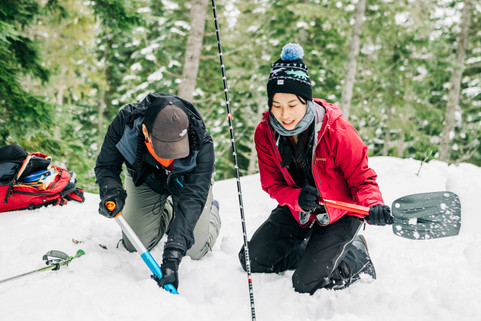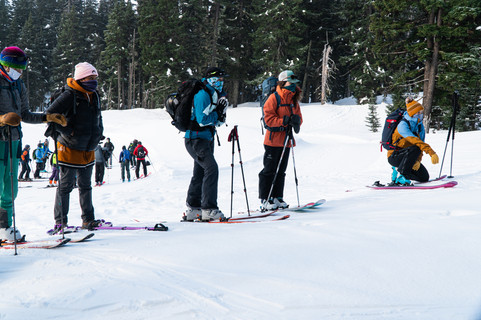Deep Impact: Catching up with 2020-2021 SheJumps Snowpack Scholarship Recipients
- Emma Renly

- Mar 31, 2021
- 7 min read
How does the Snowpack Scholarship impact people’s lives?
Beacon, shovel, probe? Check! These pieces of equipment are vital for recreating in the backcountry, but how would you know how to use them or what they are even for? Safety is critical for being able to return to our favorite activities, and SheJumps recognizes that approaching something as complex as learning to ski or becoming proficient in backcountry travel requires a lot of education and mentorship. That’s why we created the SheJumps Snowpack Scholarship. In its 3rd year, the Snowpack Scholarship provided 34 women (17 Women of Color) with a scholarship to attend an Level 1 Avalanche course from the American Institute for Avalanche Research (AIARE). This course is an important step in the journey to be self-sufficient in winter sports. This year, we also provided 10 Ikon Passes and K2 Skis for Women of Color so that more women can learn foundational skills to one day be able to adventure in the backcountry.
The Snowpack Scholarship is available to those who identify as women (transgender or cis-gender) and non-binary individuals who identify with the women’s community.

Photo by Diana Bartos
"The Snowpack Scholarship Program came to be through my combined interests in beer, skiing, and helping women access more educational resources for snow and avalanche safety. I want those interested in backcountry skiing to be able to access an AIARE education first,” explained Krystin Norman (she/her), one of the founders of the program. “As a half-Vietnamese woman, I also want to see more BIPOC (Black, Indigenous, People of Color) women to have access and encouragement in snow sports."
While the learning is never-ending, the course is designed to give the tools and knowledge to backcountry users to make smart decisions in avalanche terrain. We chatted with a handful of the AIARE Level 1 scholarship recipients about their experience and what they gained in community throughout the course.
Washington
“I was climbing Mt. Adams and saw some ski mountaineers shoot past me down the mountain - and I thought to myself, forget this, I’m going to learn how to ski! No more walking down mountains,” said Annette (she/her), one of the Snowpack Scholarship recipients. After learning to ski, and becoming a professional ski instructor herself, the AIARE 1 course provided another opportunity to deepen the skills needed for the mountains.
Snoqualmie Pass, occupied land of the Coast Salish, was the location of the Washington course, one of two SheJumps-specific courses. A classic layer of fog covered the mountains with intermittent snow flurries falling from the sky. Yasmine (she/her), another of the Snowpack recipients, explained that much of the first day was spent discussing leadership styles and how to best function in a group. “I generally backcountry ski with men with more experience and let them make decisions of where to go and what to do,” Yasmine explained. “It’s like - they have the nicer gear and louder voices so I find myself really quiet in those spaces.”
Annette agrees. “It provided a safe and vulnerable platform for learning, while providing a point of connection with women participants and female mountain guides in our local area to foster continued learning and mentorship.” The course also provided Annette the opportunity to connect with Fernanda Jardim, an Afro-Latina adventurer.
“This course made me a lot more competent and excited to get out and go in the backcountry. One of the things that kept me back is my confidence and ability to contribute on a team,” said Yasmine. “In this environment, I felt like I was functioning as a leader much more naturally in the burial drills. It made me realize how important learning skills amongst women really is, especially in vulnerable spaces. It was so good to be around people who are in the same boat as me - didn’t grow up skiing or even knowing the sport is.”
The lack of diversity in the ski industry should not go by unnoticed. “While entering into these predominantly white spaces, my presence was being questioned,” explained Annette. “I also saw that the space was so white and lacked diversity - I wanted to disrupt and dismantle that narrative. I didn’t see any instructors that looked like me so I’m going to become a ski instructor and try to provide representation.” Over the past three years and presently, Annette has provided free ski lessons and mentorship to both Women of Color and Trans Women of Color in the Seattle area. She’s created EDGE Outdoors, the first snow sports initiative to address the invisibly of those groups in the PNW. “I plan to use and share my mountain knowledge within my organization and community,” added Annette.
Similar to Annette, Yasmine’s next goal is to volunteer to instruct free lessons at her local mountain, specifically to other women of color. “I could never afford lessons growing up, so I don’t want to be part of the problem of giving $200 lessons that I, myself could never have afforded,” she said. “Plus, there'd be more representation in their staff!”
Photos by Diana Bartos
Oregon
The AIARE I course in Mount Hood National Forest, occupied land of The Confederated Tribes of Grand Ronde and Clackamas people, began with sunny skies that quickly slipped into an overnight snowfall. The avalanche danger above treeline went from low to moderate, keeping the group on their toes. Helen (she/her), one of the recipients of the Oregon SheJumps Snowpack Scholarship, noted it as an opportunity to continue the education in different conditions. “There were a couple inches of snowfall, clouds and heavier winds, which prevented us from going above the treeline,” she said. “However, the conditions made it a good day for avalanche terrain observations, digging a snow pit, snow science, as well as making snow and weather observations.”
The Oregon AIARE 1, one of two SheJumps specific courses, was led by a team of women that focused on inclusivity in the outdoors. “We all have similar shared experiences,” Added Helen. “It was comforting to feel like we weren't going through this alone and that we could lean on one another, in a non-judgement environment. I definitely feel like I have gained some great skills to feel more confident in avalanche awareness and rescue, and to travel safer in the backcountry.”
The learning for Helen doesn’t stop there. As for what’s next? “My ski objectives and goals include summiting and skiing down Mount St. Helens, touring up to Camp Muir in Rainier National Park, as well as completing the Spearhead Traverse in British Columbia when Canada opens to us in the future.”
Photos by Helen Schuckers
New Hampshire
On the occupied homelands of the Abenaki people in so-called “New Hampshire”, Kristy (she/her) and Hana (they/them/ze/hir) received the Snowpack Scholarship for an AIARE I course with Backcountry Babes. A storm had recently coated the Wobanadenok Mountains with a fresh layer of snow, leaving excitement for not only skiing untracked powder but also learning how to make educated decisions in avalanche terrain.
“When I’ve gone on backcountry tours before, I’ve deferred the avalanche safety decision making process to others and have felt uneasy about my ability to contribute to group safety,” said Kristy. “For me, this course meant I was getting more agency. I want to be an active participant in group decision making.” Added Hana, “I wasn’t familiar with AIARE before last season. This scholarship was shared with me through BIPOC community networks and I was excited to learn it’s specifically for us.” Both gave credit to the folks who brought the Snowpack Scholarship to their attention: Hana found out through Annette Diggs, founder of EDGE Outdoors, and Kristy heard from Garry Schlag.
While neither knew each other before the course, they’ve since become friends over the shared love of skiing, powder, and getting more people who identify as BIPOC into the outdoors. “I was relieved that Hana was there to feel community with,” said Kristy. “Hana gave me the courage to speak up about making land use payments to the Wabanaki Alliance with the group. Having Hana there also helped me reflect on the ways I partition parts of myself to bring to the outdoors. For example, when Hana said ‘itadakimasu’ at our lunch break, I felt an inner wall I wasn’t even aware was there come down, and I grinned hard and said ‘itadakimasu’ right back.”
Hana is also one of the brains behind Unlikely Riders, a community snow collective created to address and alleviate inequities in access to mountains, gear and knowledge for BIPOCs of all gender identities and ability levels. “To me, it means deeply honoring and seeing folks in all our intersecting identities and supporting/holding space on the hill for folks to exist (and slide, and carve) in authenticity and fullness,” said Hana.

California
Sunny skies around Castle Peak, occupied homelands of Nisenan and Washoe people, softened the hardpack conditions into soft sweet corn for the AIARE I course put on by Backcountry Babes, led by founder Emily Hargraves. For SheJumps Snowpack recipient Valentina (she/her), the experience was transformative. “We were able to have great discussions about shared experiences in a male-dominated sport and how/why inclusivity in the backcountry is meaningful and important,” she explained. “I felt much more comfortable expressing myself when I felt nervous or tired than I would have otherwise.”
Valentina is also a Ph.D. candidate at the University of Nevada Reno studying Ecology Evolution and Conservation Biology. Both her love of the outdoors and studies overlaps. “At UNR my research focuses specifically on how light pollution affects sleep, circadian rhythms, and physiological stress in birds. It turns out cities are just as stressful for the birds and other animals as they are for me,” explained Valentina. “I feel my best, mentally and physically, when I get far away from town, lose cell reception, and am completely immersed in nature. Each time I go out and come back, I realize how negatively the city affects me and how often I need to remove myself in order to stay sane.”
With newfound knowledge comes newfound access to the mountains - said Valentina, “I feel like I’ve opened the door to a whole season of the outdoors!”

SheJumps Snowpack Scholarship Program
SheJumps would like to thank Northwest Avalanche Center, Fremont Brewing, K2, Montucky Cold Snacks, and Ikon Pass for making the 3rd year of the Snowpack Scholarship AIARE I courses and making resort destinations possible. Moving forward, the program is hoping to expand into full classes outside of the Oregon and Washington regions. If you’re interested to help provide these opportunities, reach out at snowpack@shejumps.com or donate here.



























Comments